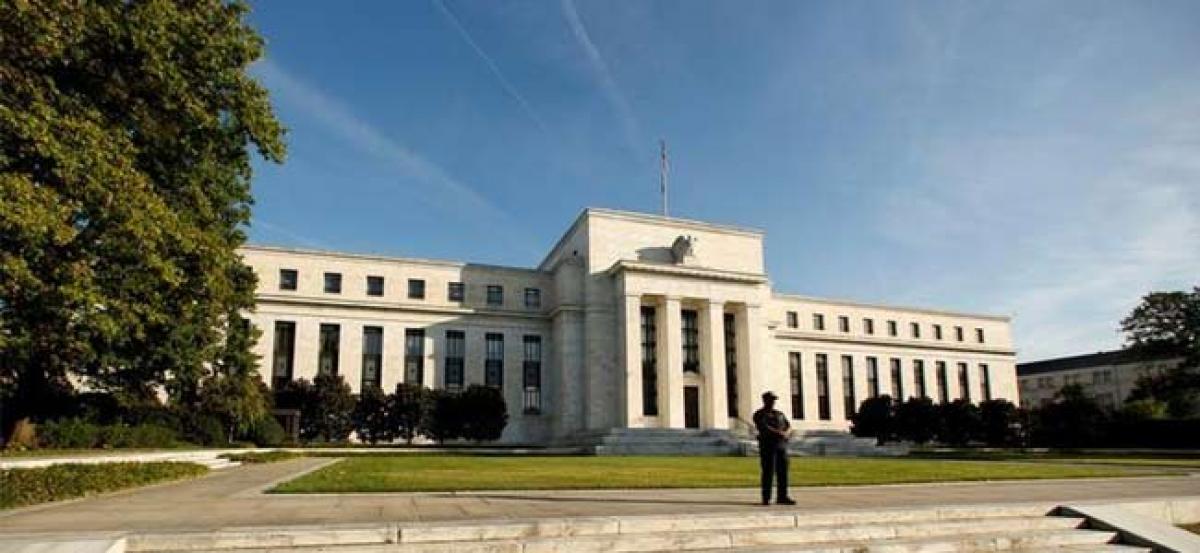Live
- Horoscope for November 28: Decoding Cosmic Clues for All Zodiac Signs
- Aishwarya Rai Bachchan’s Sister-in-Law Shrima Rai Shares Cryptic Post After Taking a Dig at Her
- Karnataka: Congress ministers indulge in lobbying ahead of Cabinet reshuffle
- Sujata joins duty after Odisha govt rejects leave extension
- Tur, urad prices have fallen in last 3 months: Govt
- NASA Alert: 130-ft Asteroid 2024 WQ2 Racing Past Earth at Over 62,000 km/h – Should We Be Concerned?
- What is UNSC Resolution 1701 and How it Relates to the Israel-Lebanon Ceasefire
- CM Mohan Majhi reviews preparedness at BJP state office ahead of PM Modi's visit
- Foods that boost the brain and sharpen memory
- Lisandro Martinez available for selection against Bodo/Glimt confirms Amorim
Just In

The Federal Reserve could begin shrinking its $4.5-trillion balance sheet as soon as this year, earlier than most economists expect, New York Fed President William Dudley said on Friday in the central bank\'s most definitive comments on the question that looms over financial markets.
NEW YORK: The Federal Reserve could begin shrinking its $4.5-trillion balance sheet as soon as this year, earlier than most economists expect, New York Fed President William Dudley said on Friday in the central bank's most definitive comments on the question that looms over financial markets.
The hawkish-sounding assertion temporarily pushed the dollar lower and raised yields on longer-dated bonds, and added Dudley's influential voice to at least three other officials at the Fed eyeing a prompt end to a crisis-era policy.
"It wouldn't surprise me if some time later this year or some time in 2018, should the economy perform in line with our expectations, that we will start to gradually let the securities mature rather than reinvesting them," Dudley, a close ally of Fed Chair Janet Yellen, said on Bloomberg TV.
A couple hours later James Bullard, president of the St. Louis Fed, repeated his preference for the central bank to begin shedding its mortgage- and Treasury-backed bonds immediately.
Economists polled by Reuters and by the Fed itself generally expect the process to start some time next year, a move anticipated to raise market yields as the world's largest holder of U.S. government debt edges back from the market.
The Fed amassed the record amount of assets in the wake of the 2007-2009 financial crisis and recession in three rounds of "quantitative easing" meant to stimulate investment, hiring and economic growth. It is no longer buying additional bonds, but it is topping up the portfolio when assets mature.
The Fed's official plan is to begin letting the bonds naturally roll off - not necessarily sell them - once its interest-rate hikes are "well underway". That is intended to shrink the portfolio to an unspecified lower level, though probably not to the pre-crisis level of around $900 billion.
Cleveland Fed President Loretta Mester and John Williams of the San Francisco Fed have also backed shrinking the portfolio this year. But Dudley, a permanent voting member of the Fed's policy committee, often paves the way for broader policy decisions and his New York Fed manages the balance sheet for the central bank.
Dudley said the bond run-off would be "passive" and done "in the background," though he added that it could influence the pace with which the Fed continues to raise rates.
"If we start to normalize the balance sheet, that's a substitute for short-term rate hikes because it would also work in the direction of tightening financial conditions," he said. "If and when we decide to begin to normalize the balance sheet we might actually decide at the same time to take a little pause in terms of raising short-term interest rates."
Neel Kashkari, head of the Minneapolis Fed and among the most dovish policymakers, acknowledged at a local banking conference that there is interest among his colleagues to shrink the portfolio "in a gradual and predictable way."
A Reuters poll found that economists at primary dealers were split over whether the Fed would announce its plans this year or next, with the actual shedding of bonds some time later. The New York Fed's most recent poll found Wall Street banks expect no change to the balance sheet until mid-2018.
The central bank hiked rates a notch in mid-March, its second tightening in three months, and it plans to move about twice more this year according to its forecasts.
Dudley, in the TV interview, said "a couple more hikes this year would seem reasonable," and that the Fed could do a little more or less depending on the economic data.
Bullard, another dovish policymaker who was addressing a students' conference in New York, said he could back perhaps one more hike this year but added "this is not an environment that data is screaming at the Fed that it has to move."

© 2024 Hyderabad Media House Limited/The Hans India. All rights reserved. Powered by hocalwire.com







